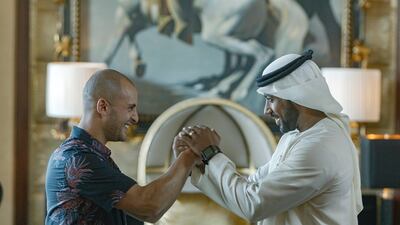Image Nation Abu Dhabi and Mohammed Saeed Harib have taken a slightly different direction with the production house's latest Emirati feature, Rashid & Rajab. Having spent the past few years dabbling with genre movies such as Zinzana and The Worthy – films that could have taken place anywhere, with any cast of actors – earning critical acclaim but limited commercial success, Rashid & Rajab has taken a highly regional approach to body-swap comedy.
The genre itself is not specific to this region, with Hollywood having gone there a hundred times before. But this particular body swap, between an Egyptian delivery driver (Alfons) and a well-to-do Emirati businessman (Abdullah) – complete with its associated dialogue gags, culinary horrors, maids, tea boys, African voodoo witches and fancy cars – could surely happen in few places outside the Gulf.
The main plot line is standard enough fare, with the protagonists swapping bodies after an accident as they are forced to pretend to be each other while trying to work out how to change back. Nice-but-dim Rajab gets a much nicer house out of the deal, but struggles to cope in Rashid's high-flying career, while also trying to avoid the advances of his vampish wife and failing to learn to tie and position traditional Emirati clothing correctly. Rashid, meanwhile, has to slum it with Rajab's far less glamorous better half and dine on her less-than-appetising-sounding traditional Egyptian snacks, such as pigeons. Rashid also swallows his pride by hatching a plot to serve as Rajab's driver so they can work together to try and get their own lives back.
The men become friends along the way and learn from their time spent living another life. Rashid realises he neglects his family, while Rajab discovers how difficult it is at the top, and everyone ends the journey a wiser person.
Alfons and Abdullah's performances should be singled out for particular praise. The pair had to learn each other's dialect for the roles and Marwan does a great job of switching from serious businessman to wide-eyed man-child, while Alfons, who is best known as a comic, is similarly convincing as a dour, work-obsessed executive.
The film was picked up at Cannes for international distribution and it'll be interesting to see how this unfolds. The humour is of a localised type. If you've seen Egyptian sitcoms in which people pull funny faces and fall over a lot, that's much of the humour here. In this sense, hiring Harib, usually a cartoon director, to helm this film was a stroke of genius and he captures the Tom and Jerry nature of the visual gags perfectly.
The largely local audience at the premiere we attended in Dubai were in stitches, but how this Middle East-specific style of comedy will play out to an international audience is unclear. Personally, I didn't find it particularly amusing the first time Rajab got tangled up in his kandura and went flying, sandals aloft, and by the 10th time the sheen had definitely worn off. Also, a lot of the dialogue gags, which the premiere audience were again delighted by, don't really come through in subtitles and will be lost on non-Arabic speakers.
For me, there was a slightly racist undertone to the way the Indian tea boy was mocked on screen, as well as the portrayal of the ridiculous African witch doctor character that caused all the trouble in the first place. You could argue that it simply shows an acceptance of the defined roles played by different nationalities in the Gulf. But however you portray it, for western audiences this kind of comedy hasn't really been acceptable since Carry on up the Khyber in 1968.
Ultimately, though, the film isn't made for western audiences, albeit any international success would surely be welcomed. For an audience raised on Egyptian slapstick and sitcoms, the opportunity to see the genre on the big screen with high production values and a talented pair of lead actors is a welcome one.

